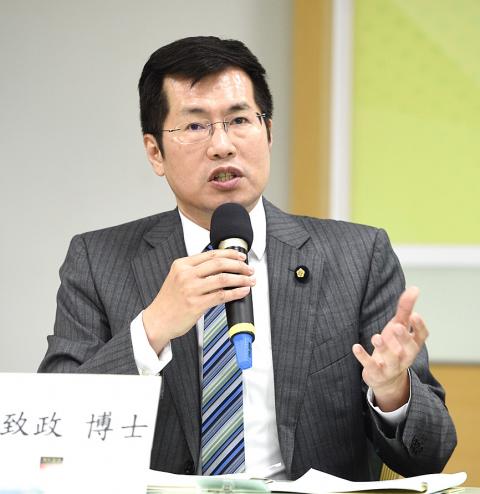The Democratic Progressive Party’s (DPP) losses in the nine-in-one elections on Saturday were mainly caused by widespread dissatisfaction with its domestic policies, DPP Legislator Lo Chih-cheng (羅致政) and academics said at a conference in Taipei yesterday.
The losses could be attributed to its problematic “middle-ground” approach to a wide range of issues from diplomacy and same-sex marriage to labor law reform, Lo told the conference.
For example, the DPP’s hesitation to follow through with legislation on same-sex marriage has drawn ire from young voters, who blame the party for “not being progressive enough,” while older voters oppose such legislation, he said.

Photo: George Tsorng, Taipei Times
“The party thought it was taking care of everyone, but ended up offending both sides,” he said.
While the DPP had expected to lose some races, the scope and extent of its losses were beyond what it had anticipated, Lo said.
“The DPP was defeated by itself, not the Chinese Nationalist Party (KMT). The KMT had no role in it. Kaohsiung mayor-elect Han Kuo-yu (韓國瑜) even had to avoid being associated with the KMT during campaigning. Our opponent was ourselves in the past two years and the progressive values we championed,” he said.
The DPP promoted the right reforms in wrong ways and at the wrong time, he said, adding that it had taken on too much at once.
The 10 referendums held alongside the elections also had a negative effect on the results, he said.
“The KMT used the referendums to mobilize its supporters. However, the ruling party demobilized its supporters by not expressing its stance on the referendums, as it was worried about maintaining government neutrality,” he said.
National Dong Hwa University professor Shih Cheng-feng (施正鋒) agreed said that numerous reforms in only two years had led to dissatisfaction among voters.
“The pension reforms were done poorly. The DPP clearly thought pensioners, who are typically KMT supporters, would not vote for them anyway,” Shih said.
National Chung Cheng University College of Social Sciences dean Soong Hseik-wen (宋學文) said reforms is necessary, but problems arose because they were promoted at the same time.
“Reforming the pension system, labor laws and energy laws made sense, and were even necessary, but dealing with them all at the same time caused problems. In addition, there were questions about how to promote them,” Soong said.
“The government did improve the economy, as data showed, but as with the reforms, the benefits from major policies were not immediately apparent,” he said. “There is usually a time lag,” he said.
However, the government should not radically adjust its policy direction just because of the election results, he said.

An essay competition jointly organized by a local writing society and a publisher affiliated with the Chinese Communist Party (CCP) might have contravened the Act Governing Relations Between the People of the Taiwan Area and the Mainland Area (臺灣地區與大陸地區人民關係條例), the Mainland Affairs Council (MAC) said on Thursday. “In this case, the partner organization is clearly an agency under the CCP’s Fujian Provincial Committee,” MAC Deputy Minister and spokesperson Liang Wen-chieh (梁文傑) said at a news briefing in Taipei. “It also involves bringing Taiwanese students to China with all-expenses-paid arrangements to attend award ceremonies and camps,” Liang said. Those two “characteristics” are typically sufficient

A magnitude 5.9 earthquake that struck about 33km off the coast of Hualien City was the "main shock" in a series of quakes in the area, with aftershocks expected over the next three days, the Central Weather Administration (CWA) said yesterday. Prior to the magnitude 5.9 quake shaking most of Taiwan at 6:53pm yesterday, six other earthquakes stronger than a magnitude of 4, starting with a magnitude 5.5 quake at 6:09pm, occurred in the area. CWA Seismological Center Director Wu Chien-fu (吳健富) confirmed that the quakes were all part of the same series and that the magnitude 5.5 temblor was

The brilliant blue waters, thick foliage and bucolic atmosphere on this seemingly idyllic archipelago deep in the Pacific Ocean belie the key role it now plays in a titanic geopolitical struggle. Palau is again on the front line as China, and the US and its allies prepare their forces in an intensifying contest for control over the Asia-Pacific region. The democratic nation of just 17,000 people hosts US-controlled airstrips and soon-to-be-completed radar installations that the US military describes as “critical” to monitoring vast swathes of water and airspace. It is also a key piece of the second island chain, a string of

The Central Weather Administration has issued a heat alert for southeastern Taiwan, warning of temperatures as high as 36°C today, while alerting some coastal areas of strong winds later in the day. Kaohsiung’s Neimen District (內門) and Pingtung County’s Neipu Township (內埔) are under an orange heat alert, which warns of temperatures as high as 36°C for three consecutive days, the CWA said, citing southwest winds. The heat would also extend to Tainan’s Nansi (楠西) and Yujing (玉井) districts, as well as Pingtung’s Gaoshu (高樹), Yanpu (鹽埔) and Majia (瑪家) townships, it said, forecasting highs of up to 36°C in those areas